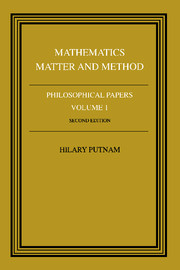Book contents
- Frontmatter
- Contents
- Dedication
- Introduction
- 1 Truth and necessity in mathematics
- 2 The thesis that mathematics is logic
- 3 Mathematics without foundations
- 4 What is mathematical truth?
- 5 Philosophy of physics
- 6 An examination of Grünbaum's philosophy of geometry
- 7 A philosopher looks at quantum mechanics
- 8 Discussion: comments on comments on comments: a reply to Margenau and Wigner
- 9 Three-valued logic
- 10 The logic of quantum mechanics
- 11 Time and physical geometry
- 12 Memo on ‘conventionalism’
- 13 What theories are not
- 14 Craig's theorem
- 15 It ain't necessarily so
- 16 The ‘corroboration’ of theories
- 17 ‘Degree of confirmation’ and inductive logic
- 18 Probability and confirmation
- 19 On properties
- 20 Philosophy of Logic
- Bibliography
- Index
20 - Philosophy of Logic
Published online by Cambridge University Press: 04 August 2010
- Frontmatter
- Contents
- Dedication
- Introduction
- 1 Truth and necessity in mathematics
- 2 The thesis that mathematics is logic
- 3 Mathematics without foundations
- 4 What is mathematical truth?
- 5 Philosophy of physics
- 6 An examination of Grünbaum's philosophy of geometry
- 7 A philosopher looks at quantum mechanics
- 8 Discussion: comments on comments on comments: a reply to Margenau and Wigner
- 9 Three-valued logic
- 10 The logic of quantum mechanics
- 11 Time and physical geometry
- 12 Memo on ‘conventionalism’
- 13 What theories are not
- 14 Craig's theorem
- 15 It ain't necessarily so
- 16 The ‘corroboration’ of theories
- 17 ‘Degree of confirmation’ and inductive logic
- 18 Probability and confirmation
- 19 On properties
- 20 Philosophy of Logic
- Bibliography
- Index
Summary
What logic is
Let us start by asking what logic is, and then try to see why there should be a philosophical problem about logic. We might try to find out what logic is by examining various definitions of ‘logic’, but this would be a bad idea. The various extant definitions of ‘logic’ manage to combine circularity with inexactness in one way or another. Instead let us look at logic itself.
If we look at logic itself, we first notice that logic, like every other science, undergoes changes – sometimes rapid changes. In different centuries logicians have had very different ideas concerning the scope of their subject, the methods proper to it, etc. Today the scope of logic is defined much more broadly than it ever was in the past, so that logic as some logicians conceive it, comes to include all of pure mathematics. Also, the methods used in logical research today are almost exclusively mathematical ones. However, certain aspects of logic seem to undergo little change. Logical results, once established, seem to remain forever accepted as correct – that is, logic changes not in the sense that we accept incompatible logical principles in different centuries, but in the sense that the style and notation that we employ in setting out logical principles varies enormously, and in the sense that the province marked out for logic tends to get larger and larger.
Information
- Type
- Chapter
- Information
- Mathematics, Matter and MethodPhilosophical Papers, pp. 323 - 358Publisher: Cambridge University PressPrint publication year: 1979
Accessibility standard: Unknown
Why this information is here
This section outlines the accessibility features of this content - including support for screen readers, full keyboard navigation and high-contrast display options. This may not be relevant for you.Accessibility Information
- 27
- Cited by
